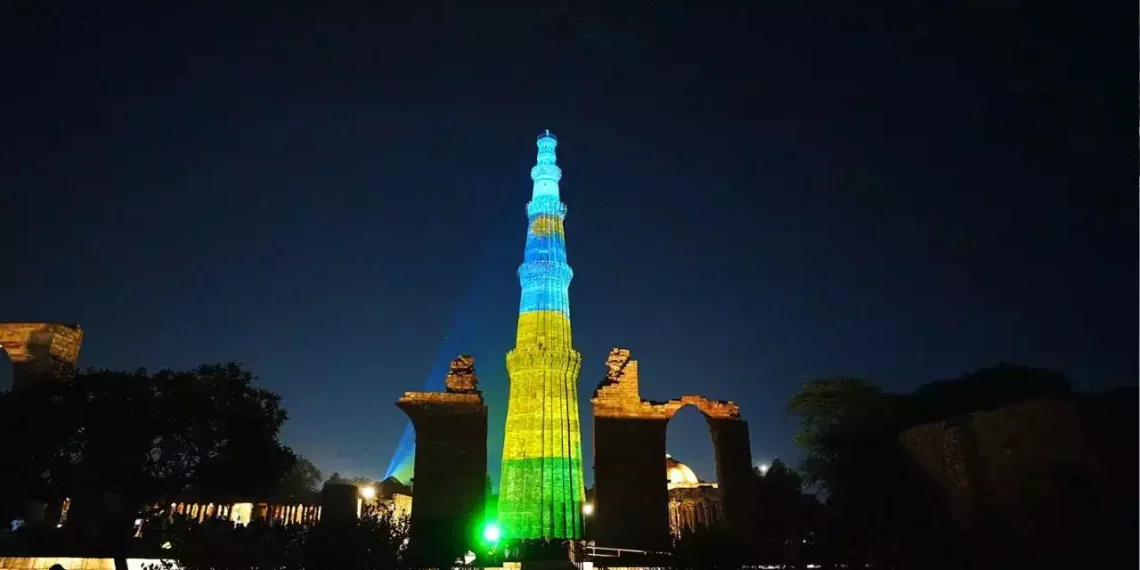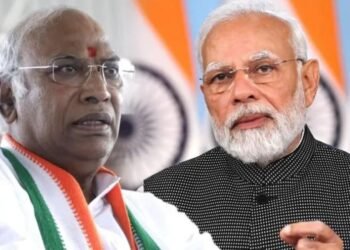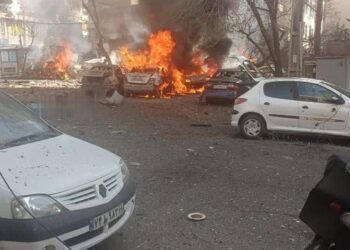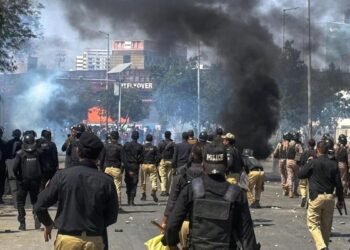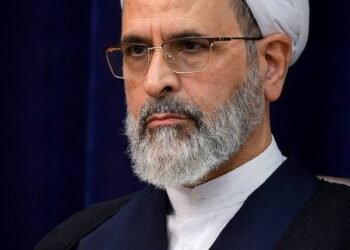In a poignant display of solidarity and remembrance, the Indian Government illuminated the iconic Qutb Minar with the colors of the Rwandan flag on the evening of April 7th, 2024. The gesture served as a tribute to the memory of the 1994 Genocide against the Tutsi in Rwanda, marking the 30th commemoration of the tragic event.
The Qutb Minar, a UNESCO World Heritage Site and one of Delhi’s most revered landmarks, was bathed in the hues of the Rwandan flag, symbolizing the unity and support extended by the Government and People of India to their counterparts in Rwanda during this solemn occasion.
The illumination ceremony, which took place from 8 pm to 8:45 pm IST, was attended by representatives from the Indian Government, including dignitaries and the media. Among the esteemed guests were the High Commissioner of Rwanda and her colleagues, along with friends of Rwanda who joined in solidarity.
#Kwibuka30, 07th April 2024: In a strong move of solidarity with Rwanda and its people, the Govt of India illuminated with Rwandan colours the Qutb Minar; one the tallest iconic monuments of India and UNESCO Heritage Site. #Remember, Unite, Renew @RwandaMFA @MEAIndia @MUKANGIRA1 pic.twitter.com/SuzizwFxtU
— Rwanda in India (@RwandainIndia) April 7, 2024
The Qutb Minar, also known as Qutub Minar or Qutab Minar, holds immense cultural significance as a symbol of victory and historical heritage in Delhi. Its towering presence, adorned with intricate architectural details and 399 steps, makes it a focal point for tourists and locals alike.
Gandhi-Mandela Foundation hosted the same event in 2023 with the United Nations India. The event marked the remembrance of the victims of the 1994 Tutsi genocide in Rwanda.
The 1994 Genocide against the Tutsi in Rwanda
The 1994 Genocide against the Tutsi in Rwanda remains one of the darkest chapters in human history. Lasting approximately 100 days from April to July 1994, the genocide saw the systematic slaughter of an estimated 800,000 to 1 million Tutsi and moderate Hutu civilians by extremist Hutu militias.
Longstanding ethnic tensions and political unrest in Rwanda fueled the genocide. Following the assassination of President Juvénal Habyarimana, extremist Hutu elements launched a campaign of mass violence aimed at exterminating the Tutsi population. The killings were carried out with brutal efficiency, using machetes, firearms, and other weapons.
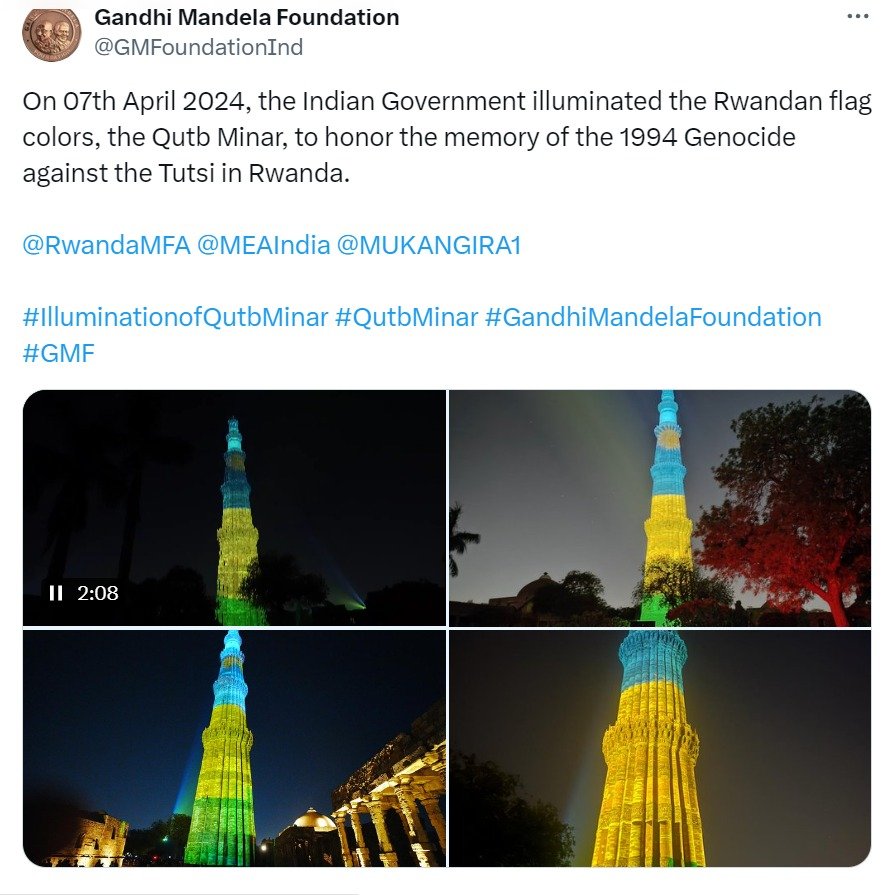
The international community’s response to the genocide was widely criticized for its failure to intervene and prevent the bloodshed. Despite early warnings and pleas for assistance, the United Nations and major world powers remained largely inactive, allowing the atrocities to unfold unchecked.
India-Rwanda Relations: A Strong Bond of Friendship
India and Rwanda share a deep bond of friendship and cooperation, marked by mutual respect and shared values. In recent years, both countries have strengthened their ties across various sectors, including trade, defense, and diplomacy.
As a rising Asian superpower, India has extended its friendly arms to Africa and other continents, forging strategic partnerships and alliances for mutual benefit. With its economic growth and development vision, Rwanda has emerged as a critical partner for India in Africa.
The illumination of the Qutb Minar with Rwandan colors is a testament to the enduring friendship between India and Rwanda. It reflects India’s commitment to standing shoulder-to-shoulder with Rwanda in times of remembrance and solidarity, as well as its unwavering support for promoting peace and harmony on the global stage.
Gandhi-Mandela Foundation Hosted the Remembrance Event in 2023 in collaboration with the United Nations India
In a significant parallel, the Gandhi-Mandela Foundation, in collaboration with the United Nations India, replicated the commemorative event in 2023. With a shared focus on honoring the memory of the victims of the 1994 Tutsi genocide in Rwanda, this gathering became a poignant reminder of the importance of global remembrance and unity in the face of such atrocities.
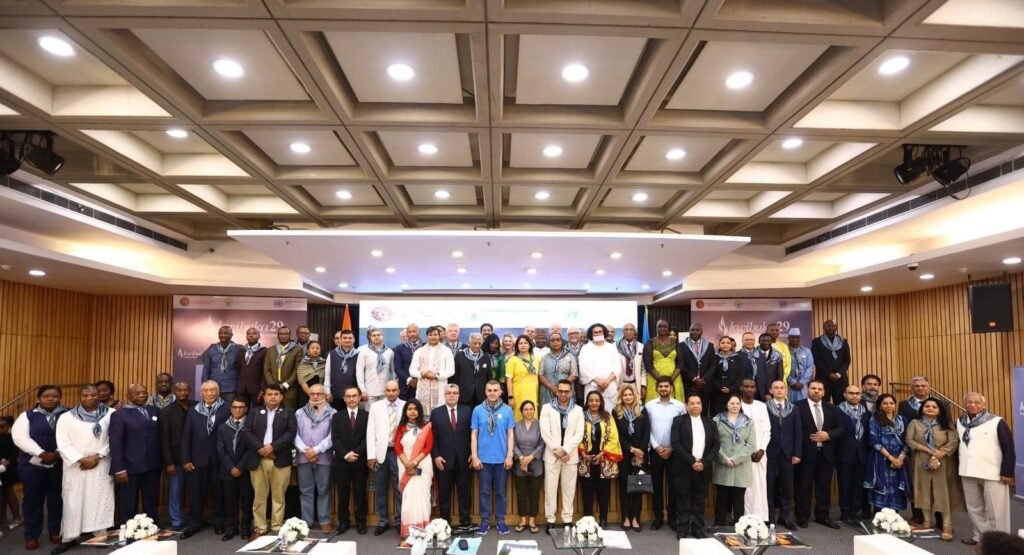
Amidst the solemn remembrance, attendees, including GMF Secretary General Nandan Kumar Jha and other dignitaries, engaged in meaningful dialogue about the lessons learned from the Rwanda genocide. Delving into the complexities of historical events, participants examined how understanding and acknowledging past atrocities can pave the way for a more compassionate and inclusive future.
Also Read – China may use Artificial Intelligence to disrupt Lok Sabha polls: Microsoft



